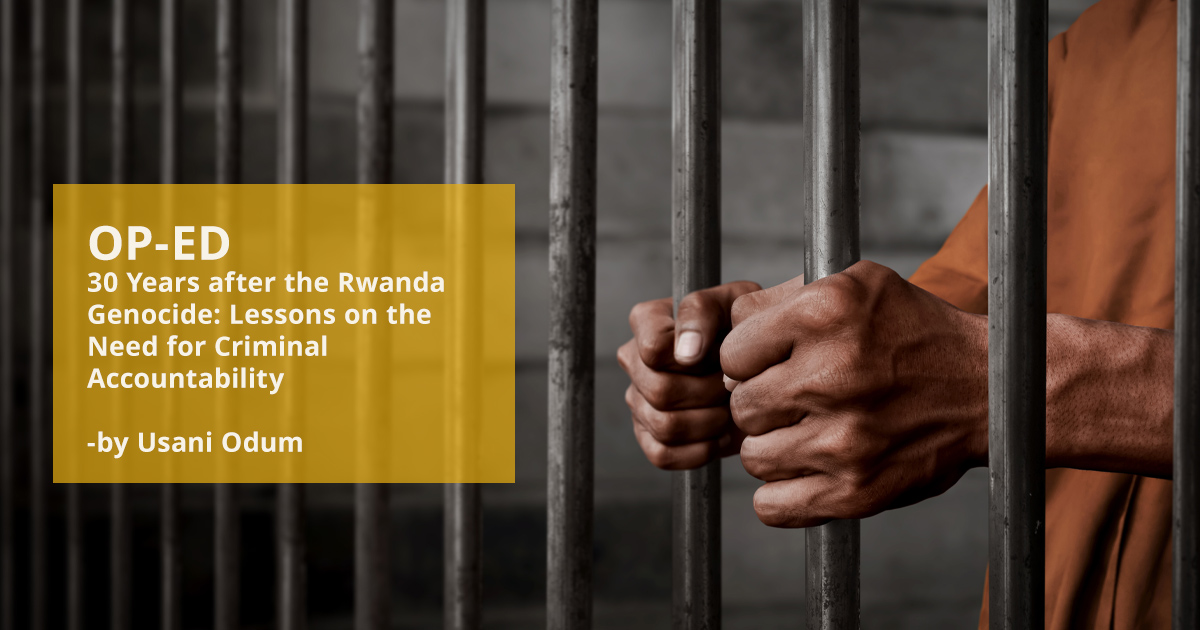by Usani Odum
This year, the African Union commemorates the 30th anniversary of one of the biggest human calamities to have occurred on the continent. From April to July 1994, an estimated one million Tutsis were slaughtered by their Hutu countrymen in Rwanda. In the wake of the genocide, Rwanda rolled out numerous transitional justice mechanisms to help piece together its broken society, including accountability measures.
Three decades down the line, while transitional justice has become accepted and consolidated on the continent, criminal accountability has been relegated to the back burner. Yet, lessons from the post-genocide Rwandan experiment and guidance from the 2019 African Union Transitional Justice Policy show that criminal accountability is still an indispensable part of transitional justice.
Contestations around Post-Conflict Accountability in Africa
Perhaps the most contested element in transitional justice is criminal accountability. In countries considering policy options to address their violent past, debates often revolve around complex questions like who will be prosecuted, by which mechanisms, and for which crimes.
These debates are especially complicated in post-conflict contexts that have not undergone political transition, where the main actors in the conflict, including rebel forces, end up being the main parties at the negotiation table. Ultimately, they assume political control in negotiated transitional governments.
Even countries that undergo political transitions get caught up in politics around the need to consolidate a fragile peace. For such societies, accountability measures are considered inimical to peace, which results in the prioritisation of non-retributive measures like truth commissions and the postponement, and eventual abandonment, of criminal accountability.
The result is often false reconciliation driven by illegitimate truth processes and other non-retributive measures that promote ‘victor’s justice’ and fail to address victims’ and survivors’ trauma. Improperly addressed traumas are often just the right catalyst for another vicious cycle of violence in post-conflict societies. Furthermore, false reconciliation often advances the interests of political elites, without considering the interests of individuals and communities that suffered in the conflict.
While truth and reconciliation are important aspects of transitional justice, their prioritisation over criminal accountability can undermine a society’s capacity to deter impunity and, by implication, break the cycle of violence. The Rwandan experiment provides lessons on the stabilising impacts of accountability measures in post-conflict societies.
Lessons from Rwanda
Rwanda has directly or indirectly held far more people accountable for their role in gross rights violations than any other post-conflict society in Africa. The government prioritised accountability over other aspects of transitional justice. Within two years after the genocide, thousands of people had been arrested and faced trial before national courts or the Gacaca traditional courts.
By the 20th anniversary of the genocide, an estimated 10,000 people, including high-level government and military officials, had been tried in what international human rights observers praised as justice for victims. This number excludes those tried by the United Nations-supported International Criminal Tribunal for Rwanda, including the country’s former Prime Minister Jean Kambanda.
Rwanda’s approach contributed to the development of international jurisprudence on accountability, including by producing the first conviction for genocide since it was formally recognised under the 1948 Convention on the Prevention and Punishment of the Crime of Genocide.
The most important contribution of the prosecutions, however, has been their impact on post-conflict stability and, by extension, the development of Rwanda. This stability, it is believed, may have afforded the country much-needed infrastructural and economic development. From 2011 to 2019, Rwanda’s GDP growth averaged around 7.5% per year, making it one of the fastest-growing economies in Africa.
The Imperative of Criminal Accountability for Transitional Justice
Despite the contestations and challenges often associated with criminal accountability, transitioning societies in Africa need to be deliberate about embedding accountability measures in their transitional justice processes. Apart from its acknowledged role in breaking the cycle of impunity, criminal accountability can achieve truth and acknowledgement for victims through perpetrator cooperation, witness testimonies and evidence provision during trials.
Moreover, prosecutions can become the basis for reparations as a legal right recognised under both national and international law, as demonstrated when the High Court of Kenya ordered the government to provide reparations to victims of sexual violence for failing to protect them and prosecute perpetrators of the 2007/8 post-election violence.
There is yet another compelling reason for ensuring criminal accountability: the international legal obligation to prosecute. International law requires that certain crimes be prosecuted by a national court or, where the state is unable or unwilling to ensure this, by an international court. Although it is soft law, the African Union Transitional Justice Policy forbids member states from adopting transitional justice processes that prevent investigations into serious crimes listed under Article 4(h) of the Union’s Constitutive Act. This provision reinforces Article 7(1) of the Rome Statute of the International Criminal Court, which lists rape, sexual slavery, forced pregnancy and other forms of sexual violence as crimes against humanity and places a legal obligation on state parties to prosecute them.
Although post-conflict contexts differ and some societies may have good reason for pursuing restorative justice over retributive justice, there is a need for restraint in the use of truth commissions and other measures that may end up promoting impunity for gross human rights violations. As shown by Rwanda, lasting peace, which then promotes development and economic stability, can be attained through effective retributive processes that hold perpetrators accountable for their roles in atrocities.
© Originally published on Centre for the Study of Violence and Reconciliation (CSVR)

Usani Odum
Human Rights and Democratisation in Africa Class of 2019
Project Officer: Initiative for Transitional Justice
in Africa at the Department of Political Affairs, Peace and Security of the
African Union Commission


